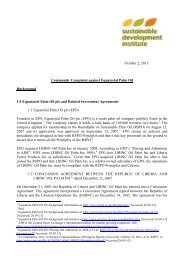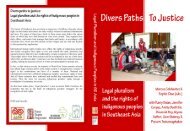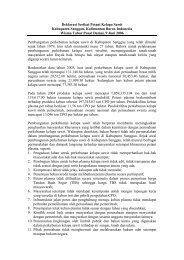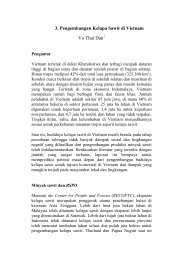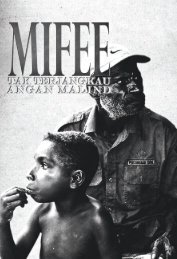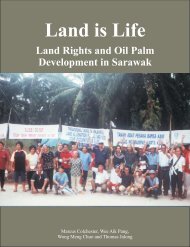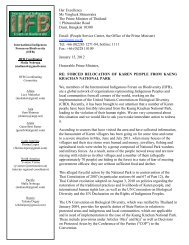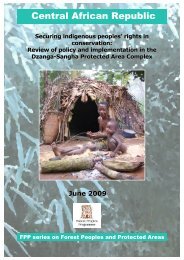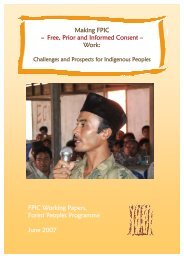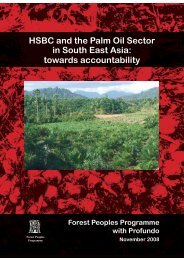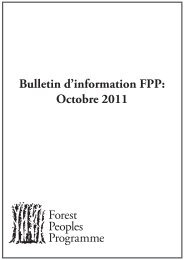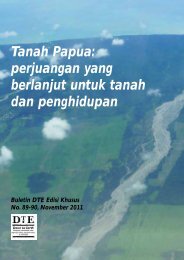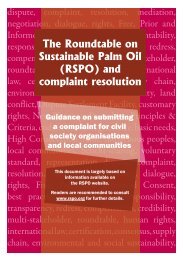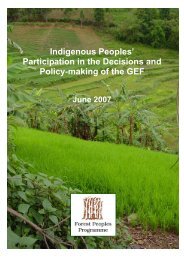The Upper Caura, Venezuela - Forest Peoples Programme
The Upper Caura, Venezuela - Forest Peoples Programme
The Upper Caura, Venezuela - Forest Peoples Programme
You also want an ePaper? Increase the reach of your titles
YUMPU automatically turns print PDFs into web optimized ePapers that Google loves.
Protecting and encouraging customary use of biological resources: <strong>The</strong> <strong>Upper</strong> <strong>Caura</strong>, <strong>Venezuela</strong>_________________________________________________________________________________________the area’s indigenous peoples. Organised tours have been visiting the <strong>Upper</strong> Merevari sincethe 1980s with mixed results from the indigenous peoples point of view. Communitydiscussions organised by Kuyujani to evaluate tourism and develop a response to thephenomenon have noted the following: Tourism is viewed both as a source of revenue and as a serious threat to traditionalvalues and health. Among the problems noted are that tourists bring drugs into the villages, sexuallyabuse Indian women, and are disrespectful of community authorities andcustoms. Most tourism companies are dominating and mistrusted and seek tomonopolise access to the choice sites. New stronger and enforceable regulations, established and monitored byKuyujani, are needed to ensure that tourism is limited and controlled. Tourism sites should be restricted to chosen sites such as Salto Para andKanadakuni which are already favoured locations and general travel by tourists toother settlements should be strictly controlled. <strong>The</strong> Ye’kwana have tried to form their own company, Merevari Tours, to promotetourism subject to the own control, but lack of capital and know-how has hinderedthis.Institution buildingGeneral Assembly decisions have concurred that to meet all these challenges, all theinstitutions of the river basin need to be strengthened including the General Assembly, theÖyaamö, Kuyujani itself and village leadership. <strong>The</strong> experience gained by Kuyujani iscarrying out ‘projects’ – mapping, developing the management plan, organising communitymeetings, supervising the logistics of river travel, establishing an office in Ciudad Bolivar,training personnel in new skills, developing an administrative capacity etc – has resulted init becoming one of the most respected and highly qualified indigenous organisations in thecountry. Kuyujani is not complacent about its achievements however.Two aspects requiring further institution building that have received particular attention todate are the development of novel mechanisms to ensure that indigenous women and theSanema remain equitably involved in decision-making. It has been noted that at the villagelevel, although women are not given formal leadership roles as shamans and ‘chiefs’(Kajiichana / kaikana), they nevertheless exert a very strong influence on communityaffairs through the voicing of their opinions inside and outside meetings and through therespect they are accorded as repositories of traditional knowledge, as mothers, as thepreparers of food and as the producers of agricultural produce. This influence and respect isattenuated at the inter-community and river basin level.A series of community level workshops, complemented by seminars promoted by theUniversidad Nacional Experimental de Guayana, are thus currently underway to exploremeans of highlighting women’s concerns and priorities and strengthening theirparticipation in decision-making. It is recognised that marrying these ideas with customarynotions of gender roles will require further discussions.50



